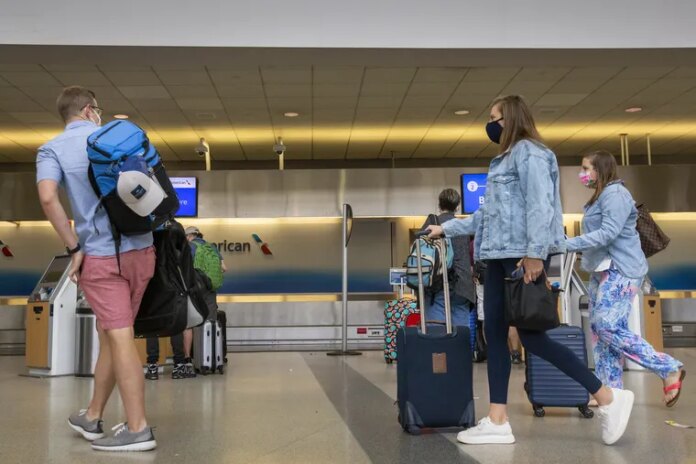When booking flights for summer get-aways, travelers are likely to find ticket prices going up.
Rising jet fuel costs are one factor. But another big one: more people are ready to travel now than they were earlier in the pandemic.
Travelers flying from Philadelphia, and booking in the next couple weeks, will pay an average $247 round-trip for summer flights in the U.S., according to data from the online price-tracking tool Hopper. That’s a 13% increase since January, and a 27% increase compared to the same period in 2021.
“There’s a tremendous amount of demand this year compared to previous years – 2020 and 2021 – and that puts a lot of upward price pressure on airlines and airfares,” said Hayley Berg, Hopper’s head of price intelligence.
And as air carriers look for ways to recoup fuel costs, said aviation consultant Bob Mann, “the consumer will see airlines testing their ability to accept higher pricing.”
Transportation Security Administration checkpoint numbers help illustrate the stronger travel interest nationally. On Tuesday the volume of passengers going through airport checkpoints — 1,736,292 people — was 86% of what it was on the same weekday in 2019. One year ago, passenger volume was just 56% of the same-weekday total in 2019.
“We’ve seen huge surges in demand really since the second week of January when the omicron wave quieted down and cities started opening back up,” Berg said.
In its latest Consumer Airfare Index report released this week, Hopper found that current prices nationally are averaging $330 for a domestic round-trip, a 40% rise since January. From that perspective, it looks like airfare from Philadelphia is on the lower side of the national average.
“We do expect prices will continue to rise, in the Philadelphia markets as well, but it seems like they’ll remain lower than the national average, which makes it a really advantageous airport to be able to fly out of,” Berg said.
While Hopper’s round-trip average out of Philly this summer is about the same as the summer average in 2019 before the pandemic, some of the most-searched U.S. destinations are showing average prices 10% or more above 2019 levels.
Average airfare to Chicago is 11% higher than in summer 2019, Los Angeles is 50% more, and Denver is 65% pricier.
Prices “will bounce up and down between now and June,” Berg said. She recommends booking summer vacations by the first week of May.
Between Dec. 30 and Wednesday jet fuel prices went up 72%, from $2.30 per gallon to $3.96 per gallon, according to the Argus U.S. Jet Fuel Index published by the trade group Airlines for America.
For airlines, their fuel bill typically makes up 20% to 30% of their costs. So when fuel prices rise, air carriers feel it.
“The impact on airlines is immediately a reduction in their operating margins,” said Mann, who runs the consultancy R.W. Mann & Company.
American Airlines, in a mid-March regulatory filing, noted the rise in crude oil and jet fuel prices, and said it expects to pay an average of between $2.73 and $2.78 per gallon for the first three months of the year.
The company “will continue to be fully exposed to fluctuations in aircraft fuel prices,” the filing said. American is the dominant airline at Philadelphia International Airport.
When fuel prices go up, “you can’t go back and reassess customers who’ve already purchased tickets,” Mann said. “But if you’re an airline, you’re thinking, I am going to see these higher prices for a while, so what am I going to do about it?”
Business travelers typically would be candidates to absorb higher ticket prices — but business travel hasn’t rebounded from the pandemic as much as leisure travel has.
“If you’re a new buyer, airlines are trying to move you up in the price structure as high as they can,” Mann said.
If there’s enough demand for a given route, the price increase may work in the airline’s favor. But in some cases, Mann said, “customers will look at that and say, forget it.”
“There’s a real balance, because this is where competition does come into play,” said Charlie Leocha, co-founder of the consumer advocacy group Travelers United.
Airlines facing rising costs and drops in demand may also end up cancelling flights.
“Because there’s going to be more cancellations, consumers should know that if their flight is cancelled, the airline has to refund you 100%,” Leocha said.










